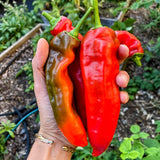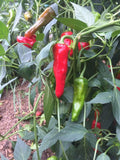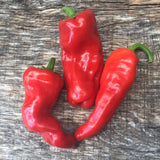Aleppo Pepper
Capsicum annuum
Fruity and bright red pepper with medium heat. Used as an essential dried spice in many Turkish, Levantine, and Mediterranean cuisines. Its robust flavor has been described as reminiscent of sundried tomatoes and with a hint of cumin.
Originating in Aleppo, Syria, one of the largest and most long-standing continuously inhabited cities of the Levant and the world, cultivation of this pepper and life in general has been interrupted by ongoing civil war. It is listed as endangered on Slow Food Foundation's Ark of Taste.
Here’s a review from our grower, Mason Harkrader from Bear Bottom Farm in Virginia. Mason is Syrian American and grows several Syrian crops for our catalog:
"This pepper is really amazing. I grew it in the high tunnel with no staking and only irrigated it about 10 times throughout the season. I used composted hog manure in the beds and no other fertility. The plants were loaded with fruit and there were very little off types, sun scald or funguses. Very impressed. Also very hot. I'm making 5 gallon crocks worth of fermented hot sauce."
Also called Halaby Pepper.
First photo by Lana Mustafa. Other photos by Mason Harkrader of Bear Bottom Farm.
Days to maturity: 80-90
Seeds per pack: 25
Germination rate: 90% on 03/25/2025
Planting / harvesting notes
Start seeds indoors 8-10 weeks before the last frost and transplant into the garden well after the danger of frost. Keep seedlings moist but do not overwater. Transplants should be initially watered in well, and plants will be most productive with regular irrigation and full sun.
Seed keeping notes
Peppers are generally self-pollinating, though we isolate different varieties of the same species by at least 50 feet, in hopes that flying insects will not cross pollinate them unexpectedly. There are several important species of peppers, so check your scientific names! Pepper seeds are ripe when the fruits have turned their final fiery color - in this case, red. Cut the fruit (consider wearing gloves), scrape out seeds, and lay them out to dry on a labeled screen or paper product in a ventilated place away from direct sunlight for a week or two. Drying the peppers before seed extraction can slightly lower your germination rates, but works fine for home seed saving as long as the peppers do not rot.









